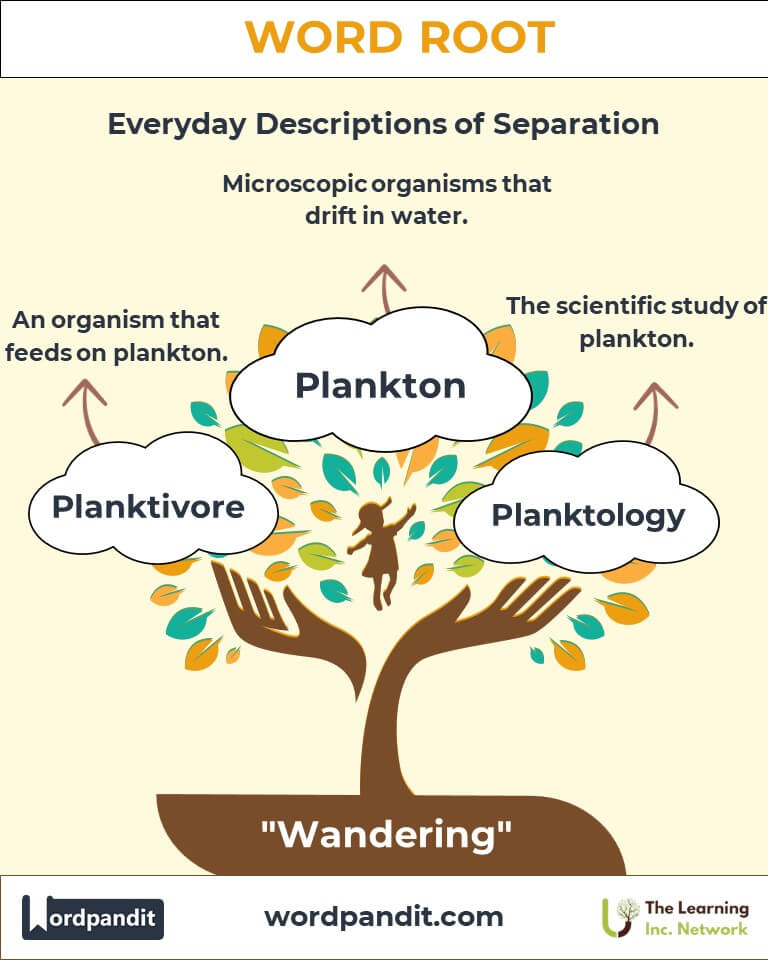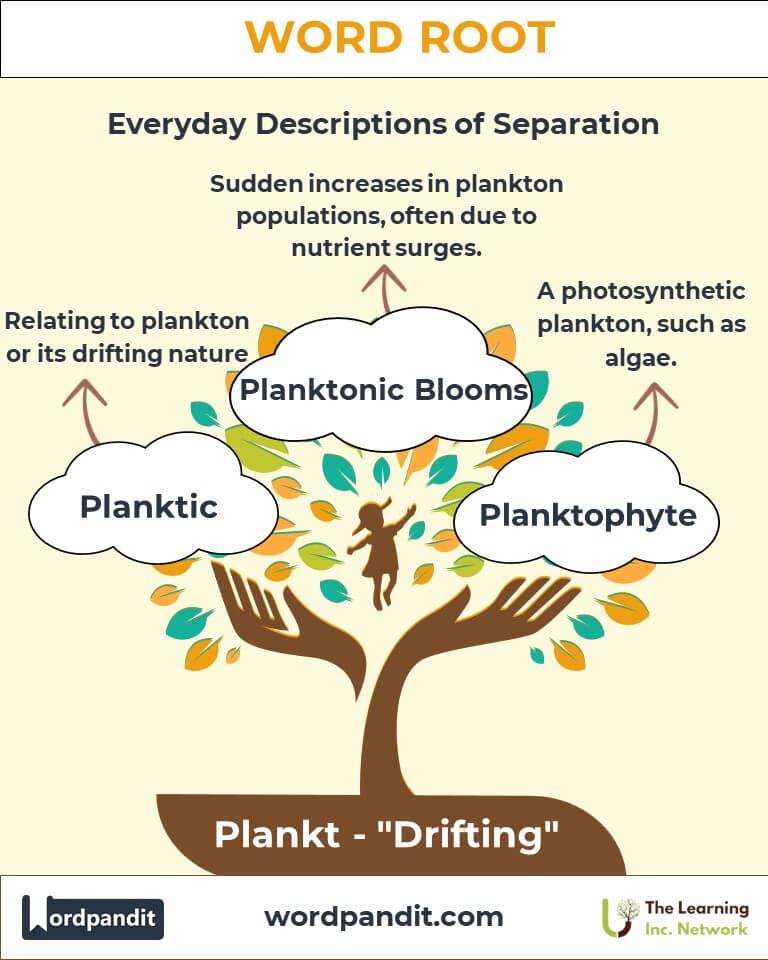Plankt: The Root of Drifting and Wandering in Language and Science
Discover the significance of the word root "Plankt," derived from the Greek term for "drift" or "wander." From marine biology to poetic expressions of life's journey, this root finds relevance across disciplines and cultures.

Table of Contents
- Introduction: The Essence of "Plankt"
- Etymology and Historical Journey
- Mnemonic: Unlocking the Power of "Plankt"
- Common "Plankt"-Related Terms
- "Plankt" Through Time
- "Plankt" in Specialized Fields
- Illustrative Story: "Plankt" in Action
- Cultural Significance of "Plankt"
- The "Plankt" Family Tree
- FAQs about the "Plankt" Word Root
- Test Your Knowledge: "Plankt" Mastery Quiz
- Conclusion: The Living Legacy of "Plankt"
Introduction: The Essence of "Plankt"
Picture the delicate drift of a jellyfish in the ocean or the aimless wandering of a seed carried by the wind. The root "Plankt," pronounced plankt (like "plank" with a "t" sound), comes from the Greek word planktos, meaning "drifting" or "wandering." This evocative root has inspired terms in marine biology, physics, and even poetry, symbolizing motion without control or direction. Whether discussing plankton in the ocean or the metaphoric drifting of thoughts, "Plankt" encapsulates a sense of flow and movement.

Etymology and Historical Journey
The root "Plankt" traces back to the Greek planktos, which means "drifting" or "wandering." Ancient Greeks used it to describe movement influenced by external forces, such as the wind or currents. Over time, the concept evolved into scientific terminology, particularly in marine biology. In the late 19th century, German biologist Victor Hensen coined "plankton" to describe microscopic organisms that drift in water, marking a significant milestone in the root's linguistic journey.
Mnemonic: Unlocking the Power of "Plankt"
Imagine a tiny raft floating aimlessly on the waves, carried wherever the current takes it. Visualize the word "Plankt" etched on the raft, symbolizing its wandering nature.
Mnemonic Device: "Plankt drifts like a raft on the sea, moving with the currents, wild and free."
Common "Plankt"-Related Terms
- Plankton (plangk-ton): Microscopic organisms that drift in water.
- Example: "Plankton forms the base of the marine food chain, sustaining countless sea creatures."
- Planktivore (plangk-tuh-vohr): An organism that feeds on plankton.
- Example: "Whale sharks are gentle giants and well-known planktivores."
- Planktology (plangk-tol-uh-jee): The scientific study of plankton.
- Example: "Her research in planktology focused on the effects of climate change on phytoplankton populations."
- Planktic (plangk-tik): Relating to plankton or its drifting nature.
- Example: "Planktic organisms are vital to marine ecosystems."
- Planktophyte (plangk-toh-fite): A photosynthetic plankton, such as algae.
- Example: "Planktophytes play a crucial role in oxygen production and carbon cycling."
"Plankt" Through Time
- Ancient Roots in Navigation:
- Greek sailors observed and named wandering sea creatures, attributing their movement to external forces like currents.
- 19th-Century Biology:
- The term "plankton" emerged as a key concept in understanding marine ecosystems.
- Modern Applications:
- The drifting nature of plankton inspired metaphoric uses of "Plankt" in literature and art, symbolizing life's unpredictability.
"Plankt" in Specialized Fields
- Marine Biology:
- Plankton: Foundational to marine ecosystems, plankton serves as a food source for many aquatic species.
- Example: "Zooplankton feed on phytoplankton, transferring energy up the food chain."
- Physics:
- Planktic Motion: Used to describe particles suspended and moving passively in a fluid medium.
- Example: "The planktic behavior of particles is modeled in fluid dynamics simulations."
- Environmental Science:
- Planktonic Blooms: Sudden population increases of certain plankton species, often due to nutrient surges.
- Example: "Harmful algal blooms result from excessive nutrient runoff and impact marine life."
Illustrative Story: "Plankt" in Action
On a sunny day, Mia, a marine biologist, set sail to study plankton blooms in the Atlantic. As she lowered her net, she marveled at how these tiny drifting organisms supported massive ecosystems. Meanwhile, a group of children on a nearby beach watched jellyfish float with the waves. “They’re like nature’s wanderers,” one child said. Mia smiled, realizing that "Plankt" not only described a scientific concept but also connected humans to the poetic motion of life.
Cultural Significance of "Plankt"
The drifting nature of "Plankt" resonates in art and philosophy, symbolizing life's unpredictability. Poets have used the imagery of wandering to evoke themes of exploration and freedom. In popular culture, the root inspires metaphors for situations where control is relinquished, akin to drifting in a vast ocean.

The "Plankt" Family Tree
- Plan- (Latin: "flat, plane"):
- Planar: Relating to a flat surface.
- Example: "The planar design emphasized simplicity."
- Platy- (Greek: "broad, flat"):
- Platypus: A flat-footed animal.
- Example: "The platypus is one of nature’s unique creations."
- Nau- (Greek: "ship, sailor"):
- Nautical: Relating to sailors or ships.
- Example: "Nautical maps guide ships through uncharted waters."

FAQs About the "Plankt" Word Root
Q: What does "Plankt" mean?
A: The root "Plankt" means "to drift" or "to wander." It is derived from the Greek word planktos, which captures the essence of movement influenced by external forces, such as currents or wind. It is most commonly associated with marine organisms that drift passively in water, like plankton.
Q: Is "Plankt" only used in marine biology?
A: While "Plankt" is heavily associated with marine biology, it is not limited to that field. It is also used metaphorically in literature and art to symbolize aimlessness or free-flowing movement. For example, drifting thoughts or wandering emotions can metaphorically tie back to "Plankt."
Q: What are plankton?
A: Plankton are microscopic organisms that drift passively in water, carried by currents. They include phytoplankton (plant-like organisms) and zooplankton (animal-like organisms) and serve as the foundation of the marine food web, supporting larger organisms like fish and whales.
Q: What is a planktivore?
A: A planktivore is an organism that feeds on plankton. Examples include whale sharks, manta rays, and certain types of fish. These creatures play a vital role in maintaining marine ecosystem balance by consuming plankton populations.
Q: What is planktology?
A: Planktology is the scientific study of plankton. Researchers in this field investigate plankton's ecological roles, life cycles, and interactions within marine ecosystems. Planktology is crucial for understanding biodiversity, ocean health, and the impacts of climate change on marine life.
Q: Why is plankton important to Earth's ecosystems?
A: Plankton is critical for maintaining Earth's ecosystems. Phytoplankton produce a significant portion of the world's oxygen through photosynthesis and play a role in regulating carbon dioxide levels. Zooplankton provide food for larger marine animals, making plankton essential for aquatic food chains.
Q: Can "Plankt" describe non-aquatic phenomena?
A: Yes, "Plankt" can metaphorically describe anything that drifts or wanders without a fixed course. For example, it could describe the drifting of clouds, the wandering of seeds in the wind, or even the aimless thoughts of a person daydreaming.
Test Your Knowledge: "Plankt" Mastery Quiz
1. What does "Plankt" mean?
2. What does a planktivore eat?
3. What is the study of plankton called?
4. Which term refers to drifting microscopic organisms?
5. What does "Planktic" describe?
Conclusion: The Living Legacy of "Plankt"
The root "Plankt" captures the essence of drifting and wandering, from tiny ocean organisms to metaphorical explorations of life's unpredictability. Its significance spans science, literature, and art, reminding us of the beauty in movement and flow. As we continue to explore our world and beyond, "Plankt" remains a poignant symbol of connection and discovery.












